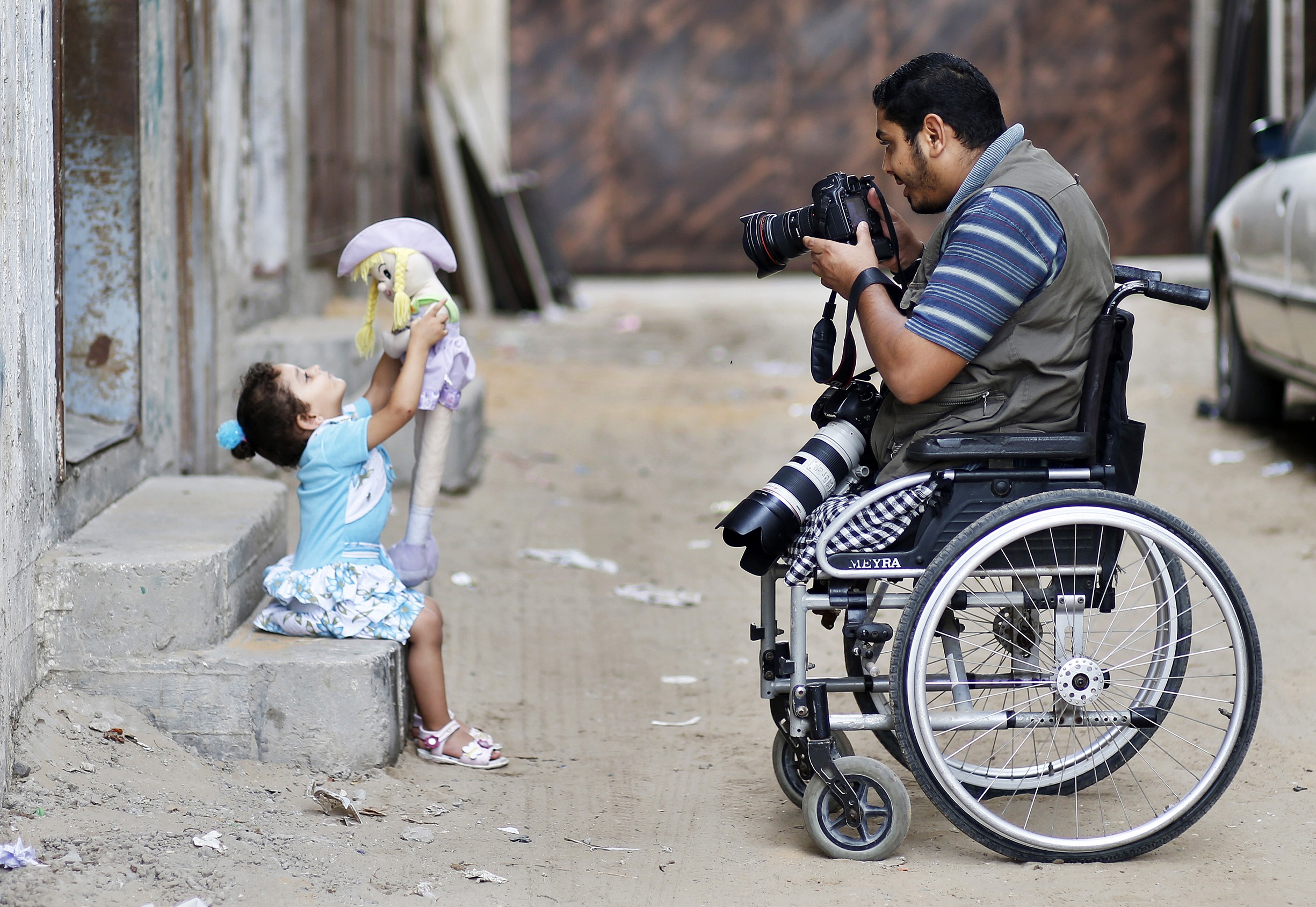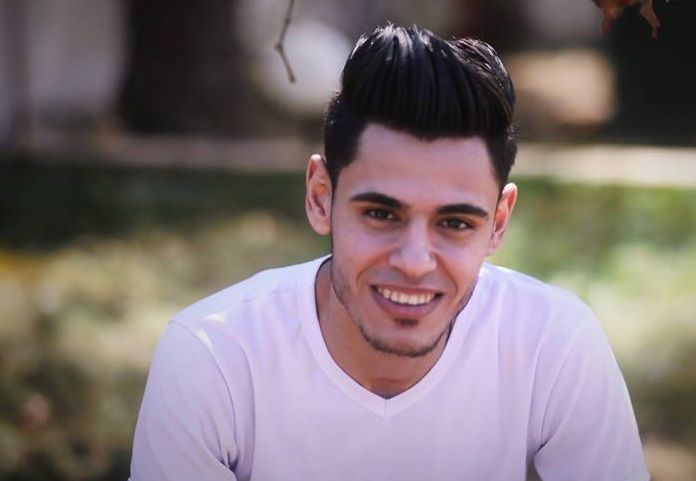قبل عشرة أعوام تقريباً، وتحديدًا قُبيل الحرب الإسرائيلية الأولى على قطاع غزة، أصيب المصور الصحفي مؤمن قريقع أثناء إعداده تقريراً مصوراً حول احتجاز البضائع على معبر كرم أبو سالم. ولحظة تصويره للتقرير، استهدف بشكل مباشر من قبل طائرات الاحتلال.. مرّ وقت قصير، فأصيب مرة أخرى أثناء وجوده في مستشفى "الشفاء"، مما أدى إلى بتر ساقيه.
لم تحل الإصابة دون عودة قريقع إلى مهنته مجدداً، فعاد إلى الميدان بعد تسعة أشهر من العلاج على كرسيه المتحرك. قبل الإصابة، اعتاد قريقع تصوير الفيديو، أما بعدها فلم تعد الأمور بهذه السهولة، فاضطر للعمل كمصور فوتوغرافي.
ليس سهلاً على قريقع التنقل والتحرك، وهي من أكثر المشاكل التي اعترضته بسبب الإصابة.. "أثناء تغطية الفعاليات، أجد صعوبة عندما أركب سيارة أجرة أو أصعد درج مبنى، كلها تعتبر من المعيقات الأساسية لعملي".
قبل عام تقريباً، قرر قريقع مغادرة القطاع بسبب الحصار الذي تفرضه قوات الاحتلال، إذ يتم إغلاق كافة المعابر والمنافذ الحدودية والتضييق على الصحفيين بشكل خاص. غادر قريقع غزة إلى تركيا، حيث استطاع إكمال عمله رغم الصعوبات، فانتشرت صور له على مواقع التواصل الاجتماعي أثناء وجوده في إسطنبول، حيث كان أمام القنصلية السعودية بعد اغتيال الصحفي جمال خاشقجي، فظهر متخطياً الحواجز ليلتقط أفضل الصور أمام دهشة الكثير من وكالات الصحافة والقنوات العالمية الموجودة في المكان.
ورغم مساعي نقابة الصحفيين لتسخير كافة الإمكانيات لذوي الاحتياجات الخاصة من أجل تقديم الخدمات والدورات الصحفية، فقد بقي العديد من التحديات الحقيقية التي ما زالت تواجههم في الحياة اليومية أو العملية، منها نظرة المجتمع وصعوبة التنقل والحركة بحرية مما يؤثر على عملهم، إضافة إلى الانقسام في الساحة الفلسطينية الذي له دور كبير في عرقلة عمل الصحافة بشكل عام، حسب قول تحسين الأسطل نائب نقيب الصحفيين في فلسطين.
قريقع ليس الصحفي الوحيد الذي أصيب خلال الحرب، والذي يعاني بسبب قلة الدعم، فهناك الكثير من الصحفيين الذين يعانون من المشاكل نفسها.
جميلة الهباش صحفية فلسطينية أصيبت قبل سنوات نتيجة استهداف منزلها أثناء القصف الإسرائيلي في الحرب الأولى التي شنها الاحتلال الإسرائيلي يوم 4 يناير/كانون الثاني 2009 على قطاع غزة، مما أدى إلى بتر ساقيها.
لم تحصل جميلة على الدعم الكافي من قبل المؤسسات الإعلامية وحتى نقابة الصحفيين، على عكس ما كانت تتوقعه، وتشير إلى أنها كثيراً ما تقدمت بطلبات للتوظيف في العديد من المؤسسات الإعلامية، لكنهم كانوا يرفضون بحجة أن إصابتها سبب في عرقلة عملها كصحفية.
حصلت جميلة على بطاقة صحفية لتسهيل عملها بعد جهد كبير، إذ عملت لصالح شبكة "الجزيرة" وصحيفة "الاستقلال"، إضافة إلى وكالة "معاً"، وجاء حصولها على البطاقة من نقابة الصحفيين بعد مساعٍ عديدة قوبلت بالتجاهل.
قرابة خمس سنوات مرت على عملها في تغطية الأحداث والفعاليات لصالح وكالة "معاً" الإخبارية، متخطية جميع الصعوبات، إذ ساعدها إصرارها على مواصلة نقل الأحداث والكشف عن جرائم الاحتلال، وإبراز هوية القضية الفلسطينية للعالم بصورة حقيقية.
دور نقابة الصحفيين
يقول الأسطل: "بعد الحروب الثلاث على غزة، اتخذت النقابة عدة قرارات لتأمين الصحفيين"، موضحاً أنه قبل أن يتوجه الصحفي إلى تغطية الأحداث، عليه الحصول على تأمين من المؤسسة الإعلامية التي يعمل معها، حيث يشمل هذا القرار الصحفيين المصابين وغير المصابين.
يؤكد نائب نقيب الصحفيين في القطاع أن النقابة حرصت على سلامة الإعلاميين من ذوي الاحتياجات الخاصة، مشيداً بدورهم في تغطية الحروب الثلاث ومسيرة العودة رغم المخاطر والتحذيرات الإسرائيلية لهم لخروجهم من أماكنهم ومقراتهم.
ويشير إلى أن النقابة شجعت الصحفيين على أداء عملهم، وهي حريصة على حقوقهم في حال انتهاكها من قبل المؤسسات الإعلامية، مضيفاً أن الصحفيين من ذوي الاحتياجات الخاصة جزء لا يتجزأ من المجتمع الفلسطيني، ولا يوجد قانون في الإعلام الفلسطيني يمنع عمل هذه الفئة من الناس، داعياً إلى "ضمان حياة كريمة لهم ودمجهم في المجتمع وإعطائهم حقهم الطبيعي"، ومؤكداً أن النقابة حرصت على توظيفهم وعدم تجاهلهم من قبل المؤسسات الإعلامية، رأيٌ يخالفه فيه المصور الصحفي مؤمن قريقع، الذي يشير إلى أن هناك تقصيراً من كافة المؤسسات الصحفية تجاه الصحفيين الجرحى والمصابين، واصفاً خدماتها بالمعدومة.
ووفق إحصائية لجنة دعم الصحفيين، فإنه منذ انطلاق مسيرة العودة الكبرى التي نظمت يوم 30 مارس/آذار 2018، إحياءً ليوم الأرض ومطالبةً بحق العودة إلى قراهم ومدنهم التي هجّروا منها عام 1948، حيث واصل جنود وقناصة الاحتلال الإسرائيلي استهداف الصحفيين وطواقم الإعلام التي تغطي مسيرات العودة.. منذ ذلك الحين، سُجلت 157 إصابة في صفوف الصحفيين الذين غطوا الأحداث منذ بداياتها، بالإضافة إلى استشهاد الصحفييْن ياسر مرتجى وأحمد أبو حسين.








































